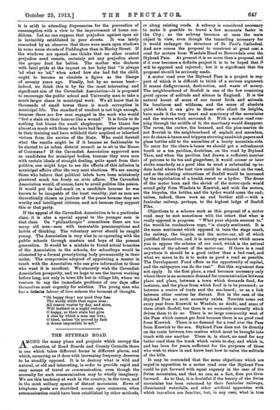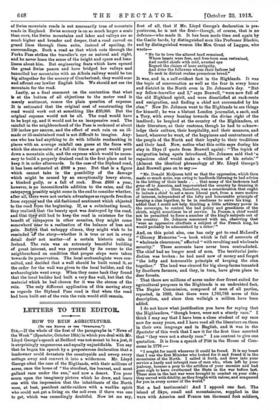THE STYHEAD ROAD.
XiONG the many plans and projects which occupy the attention of Road Boards and County Councils there is one which takes different forms in different places, and which, occurring as it does with increasing frequency, deserves to be steadily opposed. It is to destroy what is wild and natural, or old and interesting, in order to provide rapid and easy means of travel or communication, even though the necessity for such communication may be wholly imaginary. We see this tendency at work in the country, in the town, and in the most solitary spaces of distant mountains. Rows of telephone posts are stretched across open commons, when communication could have been established by other methods, or along existing roads. A subway is considered necessary to make it possible to travel a few moments faster in the City ; so the subway becomes at once the main object in view, even though the tunnelling necessary for it would endanger the structure of St. Paul's Cathedral. Aud now comes the proposal to construct at great coat a road for motors from Wasdale Head to Borrowdale over the Styhead Pass. At present it is no more than a proposal, and if it ever becomes a definite project it is to be hoped that it will be opposed and rejected ; but it is significant that the proposal should be seriously made.
A motor road over the Styhead Pass is a project in sup- port of which it is difficult to think of a serious argument. It means disfigurement, destruction, and waste of money. The neighbourhood of Scafell is one of the few remaining great spaces of solitude and silence in England. It is the natural haunt of some of our rarest birds and animals. Its loneliness and wildness, and the sense of absolute quiet which it can give to those who climb its heights, have made it the very heart and sanctuary of the mountains and the waters which surround it. With a motor road run- ning through the middle of it, the sanctuary would disappear. The raven, the curlew, the buzzard, and the pine-marten do not flourish in the neighbourhood of asphalt and macadam, nor do chars--bancs and trippers strewing sandwich papers and glass bottles add to the amenities of a lonely mountain-side. To cater for the cbars-h-bancs we should get a refreshment booth or a tea pavilion, doubtless, on the road by Styhead Tarn, and when the pavilion bad drawn a sufficient number of patrons to its tea and giugerbeer, it would sooner or later strike somebody as a good idea to erect a substantial up-to- date hotel where the best view could be obtained on the road, and so the existing attractions of Scafell would be increased by the exploitation of a health resort or a hydro. The drone of the motor horn and the shriek of the motor-cycle would sound gaily from Wasdale to Keswick, and with the motors, the bicycles, the bottles, and the hydro would come the end; unless, indeed, there were an end further still — with a funicular railway, perhaps, to the highest ledge of Scafell Pike.
Objections to a scheme such as this proposal of a motor road may be met sometimes with the retort that what is really opposed is progress. " What your objects amount to," the would-be roadmakers urge, " is simply sentiment. It is the same sentiment which opposed in turn the stage coach, the railway, the bicycle, and the motor-car, all of which justified themselves, and it is merely sentiment which causes you to oppose the scheme of our road, which is the natural outcome of the advent of the motor-car. If there is a road anywhere it should be a good rather than a bad road, and what we mean to do is to make as good a road as possible. The Development Fund offers us the opportunity of capital, and the ratepayers can do the rest." But this argument does not apply. In the first place, a road becomes necessary only where there is an economic demand for communication between place and place, between a town which demands food, for instance, and the place from which food is to be procured; or between a centre of trade and the sea-board ; or as a link between other centres far distant. But in the case of the Styhead Pass no such necessity exists. Tourists come out every year from Keswick to Wasdale, no doubt, and some of them climb Scafell, but there is no economic necessity which drives them to do so. There is no large community west of the Pass which cannot get food because there is no good road from Keswick. There is no demand for a road over the Pass from Keswick to the sea. Styhead Pass does not lie directly on the route between two centres which must be brought into touch with one another. There is, in short, no need for any better road than the track which exists to-day, and which is, and has been for years, sufficient for the purposes of those who wish to share in and know best how to value the solitude of the hills.
It may be contended that the same objections which are urged in opposition to a motor road over the Styhead Pass could be put forward with equal cogency in the case of the Swiss mountains, and that no one, as a fact, does put them forward. As to that, it is doubtful if the beauty of the Swiss mountains has been enhanced by their funicular railways, illuminated waterfalls, and other artificial apparatus with which travellers are familiar, but, in any case, what is true of Swiss mountain roads is not necessarily true of mountain roads in England. Swiss scenery is on so much larger a scale than ours, the Swiss mountains and lakes and valleys are so much higher and broader and deeper, that a road carved on grand lines through them suits, instead of spoiling, its surroundings. Such a road as that which cuts through the Furka Pass strikes the traveller's eye as natural and right, and he never loses the sense of the height and space and lone- liness about him. But engineering feats which have opened the great Swiss passes and have bridged her valleys and tunnelled her mountains with an Albula railway would be too big altogether for the scenery of Cumberland; they would scar and affront our lowlier English hills. We should not see the mountain for the road.
Lastly, as a final comment on the contention that what is at the bottom of all objections to the motor road is merely sentiment, comes the plain question of expense. It is estimated that the original cost of constructing the road would work out at something like £33,000. But the original expense would not be all. The road would have to be kept up, and it would not be an inexpensive road. The rainfall in the neighbourhood of the Pass is reckoned at about 130 inches per annum, and the effect of such rain on an ill- made or ill-maintained road is not difficult to imagine. Any- one who has had anything to do with hillside roadmaking in places with an average rainfall can guess at the force with which the stormwater of a fall six times as great would pour down a mountain side, and the expense which would be neces- sary to build a properly drained road in the first place and to keep it in order afterwards. In the case of the Styhead road, it has been estimated at £800 a year. But that is a figure which cannot take in the possibility of the damage which might be caused by an exceptionally heavy storm, a blocked gully, or a fall of rock. Even £800 a year, however, is no inconsiderable addition to the rates, and the ratepayers possibly might come in the end to consider whether, after all, there were not certain advantages as regards freedom from expenif and the old-fashioned sentiment which objected to the road from the beginning. If, as a culminating touch, they realized that the beauty spot was destroyed by the road, and that the* still had to keep the road in existence for the benefit of. ratepayers in other counties, they might come somewhere' near to a. realization of the balance of loss and gain. Befcife that unhappy climax, they might wish to be reminded I'd. the story—whether it is true or not in every detail does' not matter—of a certain historic ruin in Ireland. The ruin was an extremely beautiful building of great interest, and was presented by its owner to the neighbourhood on condition that proper steps were taken towards its preservation. The local archaeologists were con- sulted, and decided that a wall should be built round it, so the order for the wall was given to the local builder, and the archaeologists went away. When they came back they found that the local builder had built a very fine wall, but that the material which he had chosen for it was the stones of the ruin. The only different application of this moving story as regards the Styhead Pass road is that when the road had been built out of the ruin the ruin would still remain.















































 Previous page
Previous page